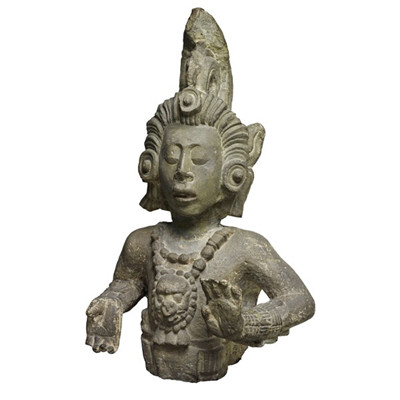Maize culture faces two new problems, one being the use of maize as a bio-fuel and the increment of prices, where it directly affects the Mexican population. The other problem being the genetically-modified maize, it's almost personally offensive-and religiously-that you are playing God, as it were...it's just very sensitive. Especially when you take corn to be used for other purposes other than to be eaten or be worshipped, but rather to be put into a car-it becomes a highly controversial issue.'
“現(xiàn)在玉米文化面臨著兩個新問題,其一便是玉米作為生物燃料之后,價格不斷升高,這直接影響到了墨西哥的人口增長。另一個問題是轉(zhuǎn)基因玉米,這幾乎是一種對個人與宗教的攻擊。人類怎么可以扮演神靈的角色?這本來是神靈的權(quán)力。所以這問題相當敏感。特別是現(xiàn)在你不是把玉米拿來吃或者崇拜,而是拿來作為汽車輸料?!這問題真是相當具有爭議性。”
So even today for some people it's unthinkable that maize, the divine food, should end up in a petrol tank. Well beyond Mexico, the idea of genetic modification of crops still causes deep unease, as much religious as scientific-a sense that the natural order is being disturbed, that humans are trespassing on territory that's properly reserved for the gods. In a very real sense, the Mexican maize god is still alive, and he's not to be trifled with.
所以即使在今天對于一些人來說,神圣食品玉米居然要被運用到汽車油箱里,這簡真是不可理喻。而且在墨西哥以外的地方轉(zhuǎn)基因農(nóng)作物還是引起人們深刻的不安,不無是從科學還是宗教角度而言,人們感覺自然秩序被打亂了,或者人類正在入侵到為神保留的神圣領(lǐng)域。
In our next programme, we'll be turning from the food of the gods to the vessels that it's cooked in. We'll be in Japan, with some of the oldest pottery in the world, and the birth of the stew.
在我們下一期的節(jié)目里,我們把目光從食物之神轉(zhuǎn)向烹制食物的器皿。我們將會到達日本,去尋訪世界上最古老的陶器,以及燉鍋的誕生。












